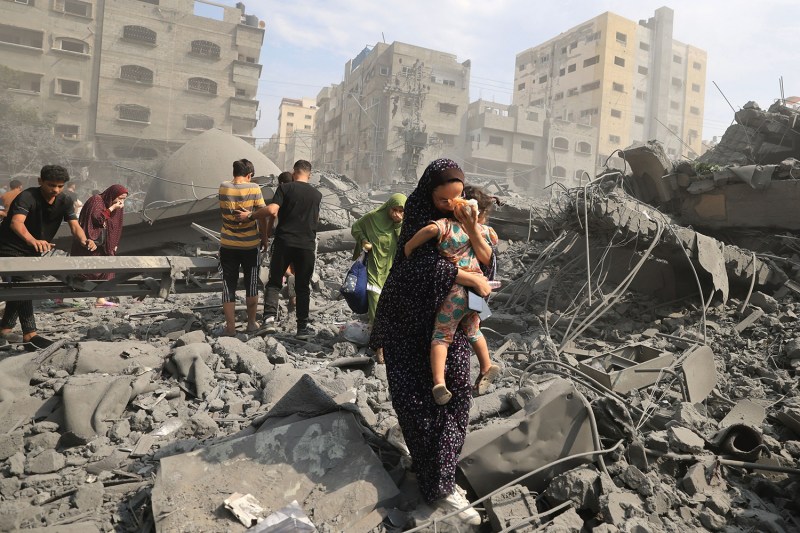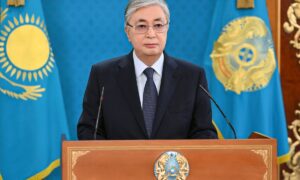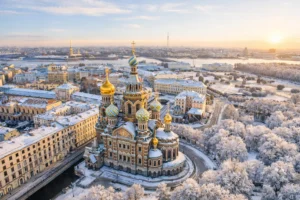Egypt’s vision on Israel-Palestine War

Egypt is a country with a rich history, situated in the north-eastern corner of Africa, particularly in the Nile River valley and delta, which housed one of the ancient Middle East’s major civilizations.
Similar to Mesopotamia in the east, this region witnessed the emergence of one of the world’s earliest urban and literate societies. Egypt boasts coastlines along the Mediterranean Sea, the Nile River, and the Red Sea, with borders touching Libya to the west, Palestine to the northeast, Israel to the east, and Sudan to the south. Covering an area of 1,002,450 km2 (387,050 sq mi), it ranks as the 29th largest country globally.
The Mediterranean Sea naturally delineates the northern boundary, while the Gulf of Suez and the Red Sea contribute to the eastern border. To the southwest along the eastern Mediterranean coast, Gaza shares a 12 km border with Egypt and is flanked by Israel to the east and north. This territory came into existence after Egypt gained control during the 1948 Arab-Israeli war. It served as a refuge for Palestinian refugees who either fled or were expelled by Zionist militias during the establishment of Israel.
Rafah Crossing, the border between Egypt and Gaza (Palestine) serves as a vital lifeline for the two million residents of Gaza. Over time, this crossing has witnessed numerous changes, openings, and closures, facilitating the movement of people and goods between Egypt and Gaza. In the ongoing conflict between Israel and Hamas, the Rafah border has assumed a critical role in the evacuation of injured individuals and the transportation of humanitarian aid.
Many critics have accused Egypt of not effectively leveraging the Rafah Crossing, leading to delays in the mobilization of humanitarian aid to Gaza.
Additionally, some critics claim that Egypt is unwilling to accept Palestinian refugees. However, the reality differs from these assertions. This article aims to unveil the truth behind such criticisms and illuminate the diplomatic and geographical role that Egypt plays in supporting the Palestinian people.
History of Egyptian Role in Peace Processes
Egypt took an early step in 1988 by being among the first countries to recognize Palestine as an independent state. The nation consistently played a pivotal role in the peace process between Israel and Palestine, aiming to prevent further escalation and destruction. In 1993, President Hosni Mubarak organized the Cairo summit between Israel’s Prime Minister Yitzhak Rabin and Yasir Arafat of the PLO. Egypt also hosted the Gaza-Jericho agreement in 1994 and initiated the Taba Summit to advance the peace process.
During the Second Intifada in 2005, Egypt intervened to halt clashes between Israel and Palestine. In the 2008-09 Gaza war, Egypt condemned Israel’s use of force in Palestine, cautioned Hamas about potential responses from Israel, and facilitated the transportation of more than 30 buses to Gaza from the Rafah Crossing to evacuate the injured. Egypt consistently provided humanitarian aid, medical supplies, and fuel to Gaza through the Rafah Crossing during the conflicts in 2010, 2012, and 2014.
Moreover, Egypt actively called for immediate ceasefires and initiated peace processes to bring an end to the hostilities. In 2012, Egypt supported Palestine by voting in its favor as non-member observer state status during the United Nations General Assembly resolution 67/19. These historical efforts underscore Egypt’s leadership commitment to promoting stability in the region through active participation in peace processes.
Israel-Hamas, October War 2023
On October 7, a surge in security instability unfolded in Israel and the Palestinian territories, marked by escalating confrontations between Israel and the Palestinian resistance in the occupied territories of the West Bank and Gaza.
This escalation was accompanied by a military operation in the Gaza Strip known as “Al-Aqsa Flood.” Despite extensive international and regional efforts at various levels, there were no discernible signs of diminishing the severity of the military escalation between the two sides, and the Israeli actions against civilians continued unabated.

From October 7, 2023, to December 6, 2023, the continuing confrontation has led to a devastating toll. Health authorities in the enclave report that on the Palestinian side, there have been over 22,000 casualties, including 7,112 children and over 4,885 women, with more than 30,000 individuals sustaining injuries. Meanwhile, the Israeli side has reported over 1200 fatalities and 5,000 injuries. Additionally, both sides have incurred significant material losses, particularly in terms of the destruction witnessed in the Gaza Strip.
The intense bombardment on the Gaza Strip, coupled with Israel’s blockade of supplies, has exacerbated a humanitarian crisis. Simultaneously, Israel and the United States are exerting pressure on Egypt to accept refugees from Gaza and relocate them to Sinai until Hamas fighters in Gaza are completely neutralized. In contrast, both from inside and outside there is criticism on Egypt for not opening the Rafah Crossing to facilitate the passage of humanitarian aid, food, water, fuel, and medical supplies to Gaza. Additionally, protests are held by Egyptians people, urging Egypt to accept refugees from the Gaza.
What is Rafah Crossing
The Rafah Crossing serves as the crucial border link between Gaza and Egypt, being the sole means for Palestinians in Gaza to connect with the outside world. This crossing facilitates the entry of essential supplies such as food, medical resources, water, and fuel into Gaza. During times of peace, the Rafah border is bustling with commercial traffic, allowing Gazans to access necessities from Egypt. However, during periods of conflict, especially between Hamas and Israel, the border transforms into a conduit for humanitarian aid and the evacuation of injured individuals to hospitals in Egypt.
Before October 7, supplies and aid used to pass through the Kerem Shalom crossing controlled by Israel. However, Israel closed this crossing after the eruption of the war, making the Rafah Crossing the sole entry point for humanitarian aid into Gaza.
Egypt’s Vision regarding developments in the current situation in Israel and Palestine Territories
Egypt has clarified the matters regarding the acceptance of Gazans refugees and the closure of Rafah crossing during the war. Israel has requested that Egypt open its borders to accommodate Gazan refugees and allow them to settle in Sinai. However, Cairo rejected this proposal. Instead of displacing Gazans from their land, Egypt advocated for a ceasefire between the conflicting parties. The Egyptian President emphasized that displacing Palestinians from their territories would jeopardize their rights to statehood. Furthermore, Egypt is currently providing shelter for more than 9.8 million refugees from Libya, Iraq, Syria, Yemen and Sudan and Palestine, meeting their needs.
Throughout the conflict, Egypt supplied over 70% of humanitarian aid to Gaza through the Rafah crossing, with the remaining 30% coming from other nations. A total of 11,200 tons of aid are provided by Egypt during the war, and over 650 tons are delivered during the four-day ceasefire.
Egypt is also receiving critical medical cases from Gaza and providing essential medical treatments in its hospitals. While the Rafah border was initially opened in the first few days of the war, Israeli attacks on the crossing rendered it inoperable. The repeated attacks damaged roads, making it difficult for humanitarian trucks to travel. Israel targeted Rafah crossing eight times, impacting civilians and aid trucks, leading to its closure due to security concerns.
Negotiations initiated by Qatar, Egypt, and Israel led to a ceasefire between Hamas and Israel. Egypt has played its crucial role in this ceasefire and restoring of peace.
Egypt underscores the resolution of the Palestine issue under UN Resolution 1967, with Jerusalem as its capital, and calls on international and regional entities to intervene for a lasting solution to the Palestinian problem, urging an end to the ongoing war to prevent a further deterioration of the situation
Statement of President Abdel Fattah Al-Sisi
Addressing a gathering in Egypt in solidarity with Palestine, President Sisi unequivocally expressed Egypt’s opposition to the forced displacement of Palestinians from the Gaza Strip to Egypt, deeming it a “red line.” He clearly opposed the idea of displacing Palestinians to Egypt, stressing that these kind of measures will not be accepted.
President Sisi assured the audience that the Rafah crossing has remained open and will continue to facilitate the entry of aid into the Gaza Strip. He voiced deep concern about the precarious and sensitive phase confronting the Palestinian cause, condemning the inhumane escalation marked by collective punishment, massacres, and attempts to reshape the ground reality through the deportation of people and land seizure.
Highlighting Egypt’s humanitarian endeavors, President Sisi disclosed that nearly 12,000 tons of relief aid, transported by 1,300 trucks, were delivered to Gaza via the Rafah crossing, with the state contributing 70 percent of the total aid.
On the diplomatic front, Egypt convened an international summit in Cairo to garner global support for ending the conflict and facilitating the flow of humanitarian aid to Gaza. The Cairo Peace Summit, held in the New Administrative Capital, and the Islamic-Arab summit in Riyadh both advocated for breaking the siege and providing immediate assistance to the Strip.
President Sisi underscored the urgent need for an immediate ceasefire and a just and comprehensive peace agreement. He noted that, through collaborative efforts with the US and Qatar, a humanitarian truce between Hamas and Israel was achieved for four days, with the potential for extension. Furthermore, he reiterated Egypt’s commitment to seeking a just solution for the Palestinian cause without it coming at the expense of Egypt.
Conclusion
Egypt has consistently supported the state of Palestine, extending assistance to its people. The country has provided shelter to nearly 9.8 million refugees from Palestine and neighbouring regions like Libya, Iraq, Syria, Yemen and Sudan. In times of conflict between Israel and Palestine, Egypt has acted as an intermediary to facilitate dialogue and restore peace. During the ongoing conflict between Hamas and Israel, Egypt has contributed 70% of the total humanitarian aid to Gazans through the Rafah Crossing which clearly indicates the intentions of Egypt’s support to Palestine. Egypt has also received injured individuals from Gaza, ensuring their transfer to hospitals for treatment.
Expressing concern for the loss of lives during the conflict, Egypt has called for an immediate ceasefire. Collaborating with Qatar and Israel, Egypt has engaged in negotiations for a four-day ceasefire, with the possibility of extension. Egypt is unequivocal about not accepting further refugees from Gaza, emphasizing that the displacement of Gazans to the Sinai region would be detrimental to the cause of Palestinian statehood. Egypt has consistently played a crucial role in the peace process in the region, demonstrating its commitment to finding a lasting solution to the Palestine-Israel conflict. Egypt asserts that the recognition of Palestine under the UN resolution of 1967, with Jerusalem as its capital, is essential for a resolution to the ongoing conflict.
Egypt’s dedicated efforts underscore the unwavering support of both the government and the people for Palestine during these challenging times. They are actively working towards restoring peace in the region. We commend Egypt for its relentless commitment to Gaza, exemplified by the provision of humanitarian aid and medical assistance. We extend our gratitude for Egypt’s tireless endeavors in contributing to the well-being of the Palestinian people.


